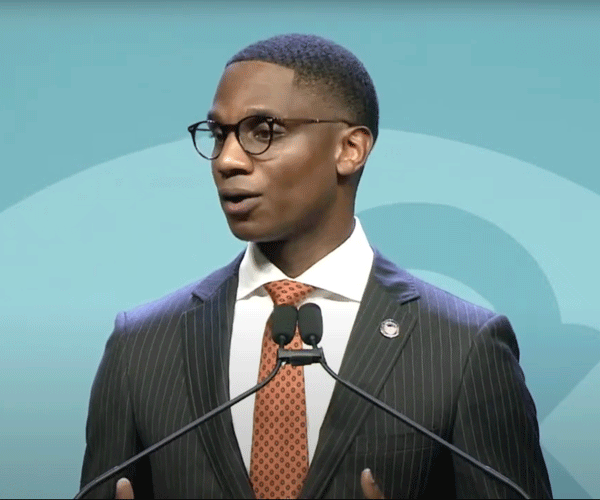The clock counts down, tenths of a second scrambling away. Only 1,218 days and a few hours, minutes, seconds "left to make a difference," it says, digital time disappearing like hourglass sand.
One of these countdown clocks, framed by a picture of Cleveland's skyline, sits on Mayor Jane Campbell's desk, reminding her. Tim Mueller, the ex-Internet entrepreneur she hired to coax jobs, businesses and new housing to Cleveland, had the clocks made; he's also given them to department heads he oversees.
A City Hall bureaucrat almost laughed at Mueller when he came into office, full of a businessman's restless optimism about getting things done.
"I've been here 15 years," the guy told Mueller. "You're just here for a cup of coffee."
| Pick up the November issue of Cleveland Magazine to read profiles of Mayor Jane Campbell's cabinet, or subscribe today by clicking here. |
So what has Jane Campbell done with her fast-fleeing time? So far, she's spent much of her energy being the anti-Mike White. And she's been good at it.
That was part of her appeal, of course, when Cleveland elected her. Campbell's supporters hoped her sunny personality would pacify the hateful brawls the previous mayor fought with the police and council. They hoped she'd hire sharp professionals to repair the dysfunctional departments White couldn't seem to fix, and that she'd communicate better, cooperate better and treat people better.
Good news: After almost a year in office, she's done all of those things. Some took a lot of effort. The finance department, law department and airport were as screwed up as you've heard — maybe worse.
"Unfortunately, I spent way more time in the beginning on just trying to figure out what the finances were," the mayor says. "It dominated my world for the first four months. When we got here, nobody knew how much money there was!" she adds, sitting up in her chair and holding out her hands to pantomime shock.
Campbell put former state budget chief Robert Baker in charge of the city's books. Most departments had to help him figure out how much money was on hand and what bills were unpaid. Now, the finance department is finally producing confident budget reports.
The mayor has brought to City Hall a mix of youthful, energetic administrators and steady old hands. Most of them project pleasant personalities, much like their boss, which will help with another transformation: After 12 years of White's intense management, Campbell's people say, employees were used to flinching when the phone rang.
"They were certain we were calling to criticize, rather than just to inquire," says Craig Tame, the mayor's social-services chief. "It was rampant throughout the building. Everyone noticed that. There was a certain paranoia."
Slowly, say the mayor's lieutenants, the mood is brightening at City Hall. "People now smile in the halls and greet each other," Tame notes.
To create a new relationship with the police, Campbell promoted a respected captain, Ed Lohn, to police chief and named a former cop, James Draper, as her new safety director. When an officer committed suicide this year, Campbell and Draper went to each police district's roll call to express condolences.
Since Mike White's flawed people skills caused real crises in the city, Campbell's governing by empathy has to count as a success. And for a first-year mayor, making your own mark on City Hall may be enough of an accomplishment.
But soon, she needs to make her mark on the city. So far, other than clean up the old mayor's messes, hire good people, communicate well and be nice, what has Jane Campbell done for Cleveland?
City Hall watchers grumble that Campbell needs to produce results soon, including bold moves to improve the city's economy. One observer questions the lack of a signature project such as Mike White's crusade to build Gateway. Campbell's decision to name four chiefs who report to her, instead of one chief of staff, confuses insiders; they aren't sure who to go to if they want to get things done.
Some on council already whisper the eternal criticism that big-city council members voice about mayors: She needs to pay more attention to the neighborhoods. Their constituents, they claim, are impatient for better police protection, more action against blighted houses. Yes, they admit, the mayor needed time to get to know City Hall, start to tackle its internal problems and strategize. But now that her team is in place, it's time for action.
When you come in, you have a lot of new initiatives and expansive ideas," says Campbell. "To be constrained by the very real challenge of the economy is hard. Frankly, we have been hard pressed to do any real new initiatives."
She says balancing the budget has been her toughest task. Taking office during an economic downturn is humbling, since tax revenues sink with the economy. She and council struggled to balance the budget this year, and they face a serious deficit in 2003.
Although the mayor won't give an example of an initiative she's had to postpone, her lieutenants say a new convention center is a lower priority for now. She'd rather talk about finding partners to help meet her goals and the ways she's trying to do more with less.
Campbell says she wants developers to be building 1,000 homes a year in Cleveland by 2005. Right now, they average about 300. More new homes would mean more new residents, a chance to stop the city's population from shrinking further and new tax revenues to fix up the rest of the city. It's the most concrete, measurable goal she's set — and a bold one, since government can't control how much developers build. All Campbell can do is offer them economic incentives, free up cheap city-owned land-bank properties and eliminate the bureaucratic headaches that make it hard to get building and housing permits.
"The easy way to do that would be to hire a couple new people," she says. "We've got to do it the hard way, which is to get existing [staff] to say they'll work harder, they'll be more creative, they'll engage their partners, get home builders excited about it."
If Campbell is frustrated by the pace of her accomplishments, she won't admit it. Asked whether she's happy with the progress she's made, and whether the finance department mess meant she got off to a slow start, she dodges the questions. "We're working very hard. We're working at it every day. ... We've set goals, we're aiming for those goals," she says cheerily.
Relentlessly positive, she sticks to her message, the one all her chiefs and department heads know by heart. She says she has four main tasks as mayor: improving education, safety and housing, and attracting jobs. She says she already has accomplishments in each category — though some, she admits, were in motion when she took office.
The schools continue to improve, Campbell says, and City Hall helped the district write its master plan for the $1 billion school-building improvement project. The mayor kept Barbara Byrd-Bennett in charge of Cleveland schools by signing her to a generous new contract (though Byrd-Bennett may have stayed mostly because New York Mayor Michael Bloomberg didn't hire her). Campbell hopes to add another achievement this month: convincing Clevelanders to vote to keep control of the schools in her hands.
This year, Cleveland has drawn up several emergency plans in response to Sept. 11, including the first-ever downtown evacuation plan. The mayor has increased the housing trust fund, which helps subsidize the construction of new, affordable housing, from $6 million to $10 million. She's working to build or build up various business parks; recently, she lured Sysco Food Service's headquarters and its 600 jobs from Bedford Heights to a business park on the West Side. And she notes that some bioscience companies have already announced this year that they're moving to the city (though City Hall had more to do with attracting some of them than others).
What's next? What mark does she want to leave on the city? "Our vision is grass-rootsy and big picture-ish," says Rodney Jenkins, who, as chief of public affairs, is Campbell's top message-crafter. "Grass-rootsy means going back to the basics. We want trash picked up, police canvassing our neighborhoods. We want cleaner, better schools."
For the administration, improving the quality of city life means fighting crime and sprucing up neighborhoods at the same time. Campbell talks about heeding the "broken windows" theory — the idea that tackling decay and petty crime will chase the worst criminals away.
This summer, Cleveland started testing the theory in certain neighborhoods on the city's southeast side. More police are patrolling the areas. Housing and building inspectors, tree-trimmers and streetlight repair crews are out in force, too. Jenkins says the effort has already improved his neighborhood: "It's quieter. People are out on their porches more." Police now patrol one park at all times, driving away drug dealers who used to have the run of the place, he adds. The experiment is now spreading to other parts of the city.
Keeping Cleveland safe also means calming tensions between police and citizens. Cleveland police have fatally shot six civilians this year — and Jenkins says the shootings and the city's finances are the two biggest crises the Campbell administration dealt with in 2002. Most of the shootings involved suspects who drew guns or used their cars as weapons against police; investigators have already ruled that some of the shootings were justified. Still, angry residents confronted the mayor about the incidents at a community meeting in August.
Jenkins says the issue lays bare the "uneasiness" between African-American men and police that's common in big cities. In response, the administration is talking to black ministers and other community leaders and examining how well the review board that investigates complaints against police is working. It's a tough issue for Campbell, who wants to get along with the police, but has to address the fears of black Clevelanders, who make up a majority of the city (and mostly supported her opponent last year).
"We cannot have residents lose their lives, period, no matter what the situation is," says Jenkins.
The mayor's "big picture" vision means a plan for improving Cleveland's economy. During her campaign, Campbell talked about the importance of imagining a new Cleveland. The city's famous comeback has stalled, she said, and we need to get it going again.
Since Campbell won't be building stadiums as White did, her success or failure at prodding the city toward a second wave of renaissance will probably be her legacy. Just as a growing economy helped the White administration succeed, a faltering one could drag Campbell down.
Tim Mueller looks at two books on his shelf. One, a 1,000-page history of Cleveland, reminds him that what the administration does will carry history's heavy weight. Malcolm Gladwell's "The Tipping Point: How Little Things Can Make a Big Difference" reminds him what's at stake.
"A strong enough wind could tip us in the wrong direction," says Mueller. The recent wave of corporate headquarters leaving Greater Cleveland — including TRW and GE Lighting — could be a negative tipping point, causing more jobs and people to flee. "Or, if we get some collaboration [with] our stakeholders, you really can tip it in the right direction," observes Mueller. That is, efforts by adventurous businesses, with City Hall's help, could spark a renewed comeback.
By 2005, Campbell says she wants Cleveland to be full of new businesses, especially new technology companies. She wants to attract foreign firms to the city, so she's developing relationships with the Ohio-Israel Chamber of Commerce and groups with connections in India and China.
"If it's not the ability to bring in a Boeing," says Mueller, "let's get Fortune 1000s and Inc-500 companies to grow and seize upon the strengths of our region." Playing to Cleveland's strengths means using our medical industry to attract biotechnology, he says. He wants to bring four or five midsized bioscience companies a year to either Cleveland or the city-owned Chagrin Highlands development.
Attracting hot new industries is a key to Cleveland's prosperity. For instance, Mueller and Jenkins talk excitedly about fuel-cell manufacturing. Since area car and tire production has already attracted polymer companies to the area — and given I-77 between Cleveland and Akron the nickname Polymer Alley — some local entrepreneurs are working to make fuel cells out of polymer byproducts.
The city can help, says Mueller, by offering incentives such as low-interest loans and tax-increment financing to entice businesses. It can also be a "facilitator" — for instance, connecting entrepreneurs with venture-capital funds. The city can also "get the heck out of the way" — that is, cut through its own red tape. And it can foster friendlier relationships with businesses.
Mueller says he's personally paid visits to most of the area's major developers, aiming to build trust. Many, he says, are now presenting more new projects and dusting off old, stalled ones: for-sale housing units in the Warehouse District, renovations of downtown office structures such as the Ameritrust Building, new wings of businesses. "Many have said they've been waiting for change in City Hall," he reports. "For whatever reason, contact broke off" during White's reign.
Cleveland also needs to make talented, restless people happy to live here. Mueller has been reading Richard Florida's popular new book "The Rise of the Creative Class," which argues that successful cities need a rich culture and quality of life to keep creative people from moving away.
Chris Ronayne, Campbell's planning director, sounds like he's read the book, too. He wants to create an unbroken line of parks and bike trails along the lakeshore and all the way down the Cuyahoga River's banks. He and Campbell have gotten behind local business groups' idea of rebuilding the Shoreway and opening up the lakefront. That project will take years to realize, but Campbell says she hopes to be close to constructing one section of the new Shoreway when her first term ends.
"We've got to turn a corner relatively quick," says Ronayne. "Unemployment has been high in this community. We're in a fierce competition for companies. People have demonstrated that they're mobile [by moving] to suburbs, exurbs and now outside of Cuyahoga County.
"Young people have choices. They can choose Pittsburgh. They can choose Chicago. They can choose Columbus. We need to lay the groundwork for them to choose Cleveland."
Impatience is a good thing for the Campbell administration. By the end of this year, it will have 1,100 days left on its countdown clock. In the history books, that isn't very long.



